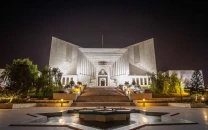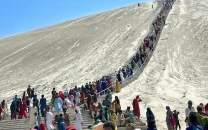PIA to rehire retired pilots
PIA has started hiring retired pilots on a contractual basis to ensure its flights are not delayed.

The PIA has borne losses of approximately one billion rupees in the past two weeks due to the go-slow policy of the Pakistan Airline Pilots Association (Palpa). Members of the association, which represents PIA pilots, have been refusing to operate scheduled flights, saying that the airline makes them work longer hours than advised for pilots. Official PIA figures show that since the strike began, 64 international and domestic flights have been delayed while 12 flights had to be cancelled.
According to sources, this decision was made by PIA’s board of directors in a meeting last month that was chaired by Defence Minister Ahmed Mukhtar. Participants decided that to overcome the shortage of pilots, PIA will hire experienced pilots who had retired from the airline upon attaining the retirement age of 60 years. However, they will now be contractual employees.
PIA was the only airline in the country that did not rehire pilots after retirement. Internationally, as well as according to the rules of Pakistan’s aviation regulatory body the Civil Aviation Authority (CAA), pilots can fly to the age of 65 years. Private Pakistani airlines, Shaheen International Airlines and Airblue both employ a number of pilots who are between 60 and 65 years of age. The policy has come under scrutiny since an Islamabad-bound plane of Airblue crashed in to the Margalla Hills on July 28, killing all 152 people on board. The pilot was 62 years old.
Sources claimed that the PIA had adopted this policy to avoid further ‘blackmailing’ by Palpa members. The airline’s managers, sources said, believe that the Palpa will not be able to manipulate these rehired pilots who will be used in place of Palpa pilots who refuse to fly. The management has also decided that they will revoke contracts of these pilots if they played into Palpa’s hands. Representatives of Palpa and PIA have met twice but negotiations have failed. Desperate to go ahead with flights, PIA’s managing director Captain Ijaz Haroon has himself had to fly three domestic flights.
PIA’s general manager for public relations Sultan Hassan, when contacted, confirmed that the board of directors had approved rehiring pilots as per the CAA’s policy. “PIA needs pilots with experience of flying big planes. This opportunity is open for all those pilots who have retired but still fulfill the CAA’s criteria as well as for those who are about to retire,” he said.
Speaking about the legality of this move, Hassan said that this clause was included in the working agreement 2009-2011 that was signed between the PIA and Palpa.
Talking about Palpa’s demands and the go-slow policy, he said that the PIA gave its pilots enough relaxation time. “PIA is already paying huge amounts to its pilots and giving them relaxation time as per international flying rules,” he said.
Palpa General Secretary Captain TM Rabbani also confirmed that the PIA had started hiring retired pilots but said that according to an agreement between the PIA and Palpa, pilots cannot be rehired without consultation with Palpa. “We will not allow the hiring of those pilots who do not abide by Palpa’s safety parameters,” he said, adding that even if they did allow it to go ahead, rehiring them would be useless. He suggested that the PIA should give a chance to new pilots and deal with pending promotions to overcome the shortage.
Published in The Express Tribune, August 6th, 2010.



















COMMENTS
Comments are moderated and generally will be posted if they are on-topic and not abusive.
For more information, please see our Comments FAQ